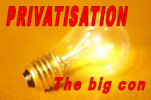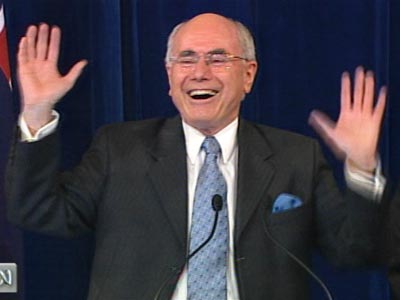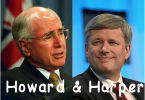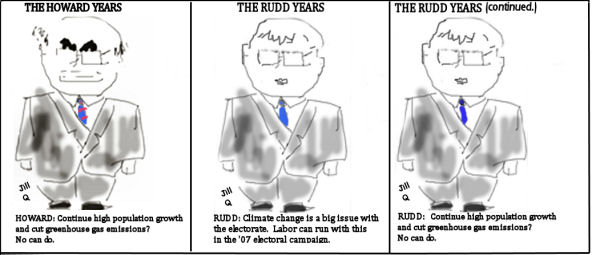
The report by past Federal Treasurer Peter Costello of his supposedly independent investigation into Queensland State finances on behalf of the Queensland Government Commission of Audit recommended the full privatisation of Queensland Government's electricity generators. Only last year, the Queensland public, outraged at the asset fire sale embarked upon by former Premier Anna Bligh without any electoral mandate whatsoever from the 2009 state elections, savagely punished Labor at the ballot box leaving only 7 sitting Labor members in a house of 89.
That, less than a year after, the new Government of Campbell Newman has contrived an excuse to continue with policies, that have been so resoundingly repudiated by Queenslanders, provoked outrage. An example of the outrage felt is a new opinion poll taken by news.com, which shows that Qld privatisation [is] opposed by 85%: poll.
Professor John Quiggin of the University of Queensland responded on 6 March with a post on his web site. That post included a link to a pdf report which, by examining the disastrous history of privatisation across Australia in recent decades, comprehensively demolishes the case for any privatisation.

In fact, much of the ground covered by Professor Quiggin has also been covered by candobetter.net and, before that, the site citizensagainstsellingtelstra.net. I realised that Professor Quiggin's pdf document could be made so much more useful if it were reformatted from pdf into html so that it could be directly linked to other material on the Internet which is also against privatisation, particularly on candobetter.net. This document is the result of that work.
Privatisation of Queensland Electricity Assets: A Preliminary
Evaluation
John Quiggin
School of Economics
University of Queensland
Summary
There are two main arguments for privatisation of electricity assets:
(1) The sale of income generating assets, such as electricity assets, will improve the financial position of state governments, allowing new investment in assets such as schools and hospitals.
(2) The process of electricity market reform associated with the creation of the National Electricity Market requires privatisation to function properly
These arguments are assessed and shown to be unsound. Privatisation is unlikely to improve the financial position of the state. If badly managed, as has been the case in most previous asset sales, it will leave the public worse off. 'Reforms' to the electricity market over the past two decades have resulted in higher prices and a misallocation of investment, which has been made worse by privatisation and corporatisation. The entire process should be reassessed before any change in ownership structures is considered.
Analysis undertaken by Queensland Treasury or by the Costello Commission of Audit is purely political, and of no evidentiary value. The weakness of this analysis is demonstrated by the consistent refusal of Treasury and the Commission to respond to criticism by a leading economist.
Privatisation of Queensland Electricity Assets: An Economic
Evaluation
Since the early 1980s, privatisation of public assets has been demanded by advocates of 'microeconomic reform' and strongly supported by the financial sector. It has been opposed, equally strongly, by voters, who have rejected privatisation whenever they have been given the chance (Kelley and Sikora 2002). A variety of claims have been made in favour of privatisation (Kay and Thompson 1986), but experience has shown these claims to be false in nearly every case.
According to press reports, the Newman LNP government in Queensland is considering the sale of the state's electricity assets. The government has indicated that the Queensland Commission of Audit, headed by a former Federal Treasurer, has recommended the sale of assets including electricity assets, although the Commission's report has not yet been made public.
There are two main arguments for privatisation of electricity assets
(1) The sale of income generating assets, such as electricity assets, will improve the financial position of state governments, allowing new investment in assets such as schools and hospitals; and
(2) The process of electricity market reform associated with the creation of the National Electricity Market requires privatisation to function properly.
Neither of these arguments is valid. The first was comprehensively rejected, both by economists and by the general public, when it was put forward by the Bligh Labor government. The second has been discredited by the failure of electricity market reform to achieve any of the goals originally put forward. In particular, whereas reform was expected to result in lower prices, the actual outcome has been a neardoubling of real prices in most Australian markets. This outcome has occurred regardless of whether electricity assets are publicly or privately owned, but evidence suggests that the outcomes have been worse under privatisation.
Background
Before the 1990s, electricity supply infrastructure in Australia was almost entirely owned and operated by statutory authorities, which were obligated to supply electricity at the lowest possible cost consistent with meeting a range of policy objectives. The development of the electricity industry by the public sector was highly successful in delivering cheap and reliable electricity at prices sufficient to service debt associated with the construction of power stations and electricity networks. In most, though not all, cases electricity systems were vertically integrated, with generation, transmission, distribution and retail functions being undertaken by the same authority.
The creation of the National Electricity Market has involved the separation of the industry into separate generation, transmission, distribution and retail components. Within this framework, transmission and distribution services are undertaken by regulated monopolies. An electricity 'pool' market operates continuously to match demand from retailers with supply from generators. In addition, generators may make long-term contracts with retailers or consumers. In addition to matching supply and demand, the market is supposed to provide investment signals.
Under the corporatisation system, required by National Competition Policy, the boards of statutory authorities, with representation from a range of stakeholders have been replaced by a system mimicking that of a private corporation. The boards of corporatised government business enterprises are appointed by, and have a fiduciary responsibility to, the shareholding ministers, normally the Treasurer and the minister responsible for energy.
The promoters of National Competition Policy and electricity market reform envisaged a fully privatised, competitive market, as the natural outcome of the prices (Quiggin 1996). After twenty years, movement towards privatisation remains limited, and the hoped-for market outcomes have not eventuated.
The history of privatisation
Privatisation proposals have been advance or implemented in most states. In nearly all cases, these proposals have been both economically unsound and politically disastrous. 1 Here is list of examples from the electricity industry
* Victoria: The industry was privatised by the Kennett Liberal government in 1993 The attractiveness of the assets was enhanced by a general increase in prices implemented before the sale. This was arguably the most favourable case for privatisation since it was undertaken at a time of strong demand, and limited supply, for infrastructure assets. As a result, the prices paid by buyers were substantially higher than they were able to realise in subsequent resales. Despite this, the benefits to the public were limited. The interest savings realised by using sale proceeds to repay debt were about the same as the earnings foregone as a result of the sale. (Quiggin 2002, Cahill and Beder 2005).
The Kennett government's policies were strongly supported by policy elites, but were rejected by the Victorian public. Despite coming into office under the most favourable conditions possible, with the previous Labor government seen as responsible for financial chaos, the Kennett government survived only two terms.2 The Liberal Party remained in opposition for three terms after Kennett's defeat.
* South Australia As in Victoria, a conservative government had been elected in a crisis atmosphere following the failure of the Bank of SA. The electricity industry was privatised by the Olsen Liberal government in 1998, despite a promise to the contrary in the previous election in 1997 (Spoehr 2003). Privatisation produced both an increase in electricity prices and a substantial loss to the public. The conservative government was defeated in the subsequent 2001 elections and has remained in opposition ever since.
* Tasmania. The Rundle (Liberal) government proposed the partial privatisation of the HEC in 1998. Analysis showed that the likely sale price would be insufficient to offset the loss of earnings from the HEC. (Quiggin 1998) The Rundle government was defeated in an election in which the privatisation proposal played a substantial role, and the Liberals have remained in opposition ever since. Flows of income to the Tasmanian government from its publicly owned assets have remained substantial.
* New South Wales. Privatisation of the electricity industry was proposed by the Liberal Party Opposition, led by Kerry Chikarovski in 1999. In an election fought on this issue, the Liberal party was overwhelmingly defeated. Despite this, successive Labor governments sought to implement privatisation policies, with disastrous political consequences and no economic benefits. This pattern has been continued by the O'Farrell Coalition government, which now plans to sell the remaining electricity generators.
* Western Australia The Barnett Liberal government is currently proposing privatisation of electricity assets.
* Queensland The retail sector was privatised by the Beatty government. 3 Generation and distribution have remained under public ownership. However, the Bligh government sold a wide range of public assets, on the spurious pretext that this would finance additional investment in schools and hospitals. These claims were widely criticised by economists (Group of 20 Economists 2009, Quiggin 2010, Walker and Walker 2009).
Following Bligh's catastrophic defeat, the incoming Newman government announced that public sector finances were in a disastrous state, requiring massive cuts in services of all kinds, notably including health and public education. The Queensland Treasury, which endorsed the spurious claims of the Bligh government, is now doing the same for the equally spurious, but contradictory, claims of the Newman government.
* ACT The Carnell Liberal government proposed the sale of the electricity supply firm ACTEW in 1998 (Quiggin et al 1998). The proposal was defeated and instead, ACTEW established a joint venture with AGL. The Carnell government was defeated in 2000, and the Liberal party has been in opposition ever since.
At the Commonwealth level, both Labor and Liberal governments undertook privatisation. The most significant case was that of Telstra, managed by then-Treasurer Peter Costello. The sale was mismanaged in many ways (most notably by selling the business in three parts, with an initial promise to retain public ownership), with the result that the return to the public was greatly reduced. With the exception of the second stage sale, undertaken at the height of the 'dotcom' boom, the sale proceeds were of less value than the earnings foregone through privatisation. Moreover, the privatisation was a disaster for telecommunications policy. Telstra refused to invest in modern broadband, necessitating the reentry of government into the telecommunications sector through the NBN.
Fiscal arguments for privatisation
The Bligh government undertook sales of assets valued at more than $10 billion, based on the claim that such sales were necessary to improve the state's fiscal position. These claims were rejected by the then LNP Opposition. On assuming office, the Newman government announced that the state's finances were in a dire position, bordering on that of Spain or Greece. At no time has the Newman government given any credence to the claim that the previous government's asset sales improved the state's fiscal position. Such a claim is inconsistent with everything the LNP has said both before and after taking office.
More relevantly, the Bligh government's claim was rejected by economists representing a wide range of viewpoints regarding the merits of privatisation. Their statement (Group of 20 Economists, 2009) is worth quoting in full
Decisions on the sale or retention of public assets have important implications for competition and public policy, as well as for the fiscal position of governments. These decisions cannot!!be resolved on the basis of general ideological arguments for or against public ownership, and require informed public debate in each case. The normal lines of economic debate include whether a given business is more efficiently operated in the private or public sector, the appropriate allocation of risk and the extent to which the enterprise is required to pursue social as well as financial objectives.
The signatories of this statement have a range of views on the appropriate balance between the public and private sectors and on the merits of privatisation in particular cases. However, we share the view that these questions should be resolved on the basis of wellinformed discussion of the economic and social costs and benefits of privatisation, and not on the basis of spurious claims that asset sales represent a costless source of income to governments.
The arguments put forward by the Queensland government in its booklet 'Facts and Myths on Asset Sales' do nothing to promote a well-informed debate. Two central claims are particularly, and sadly, noteworthy. In relation to five public assets proposed for sale, the "Facts and Myths" booklet states
Keeping these businesses would cost the Government $12 billion over the next five years. That's $12 billion spent on new coal trains and new wharves that can't be spent on roads, schools or hospitals.
This claim is economically unsound. Forgoing income generating investments, and borrowing an equal amount to fund investments that return no additional revenue, leaves the government with no flow of income to service the associated debt. The necessary income must be raised by increasing taxes or cutting expenditure.
Selling public assets will improve the public sector's fiscal position only if the price realised for the assets exceeds the value of the income stream that the asset would otherwise generate for the public sector. In this respect, the 'Facts and Myths' booklet states
The total return from all five businesses in 2008-09 was approximately $320 million When the sale process is completed, it is anticipated the Government will save $1.8 billion every year in interest payments.
This is an invalid, apples-and-oranges comparison. The $320 million figure consists solely of dividend payouts, excluding retained earnings, tax-equivalent payments and the interest paid by the government business enterprises to service their debts.
The $1.8 billion represent the interests that would be saved, at a rate of about 6 per cent, if the state realised $15 billion from the asset sale and avoided $12 billion in new investment. Most of this
interest would be serviced out of the revenues of the GBEs, and can therefore not be compared with dividends derived from earnings after the payment of interest and tax.
The people of Queensland deserve a robust and well-informed public debate over the costs and benefits of privatisation. So far they have not received it.
The spurious claim regarding the costs and benefits of public ownership was surreptitiously removed from the Treasury website when its falsity became undeniable. The claim that asset sales could finance new investment in schools and hospitals was maintained until the Bligh government's defeat. However, the Budget papers reveal no apparent increase in investment under the Bligh government. The incoming Newman government claims that there is no possibility of new investment, and that hospital services must be outsourced to the private sector.
The case of the electricity assets
There has been no attempt to present an assessment of the costs and benefits to the state of public ownership of the electricity industry. However, the Newman government has repeatedly made the point that CS Energy has lost money in recent years, requiring injections of public capital as a result.
The implication is that the publicly-owned electricity industry is a burden on the Queensland government and public, and that selling assets would relieve us of this burden. This implication is false. The electricity sector as a whole has been, and will remain, consistently profitable. However, the structure of the sector, produced by the reforms of the 1990s mean that there is a constant shifting of risk between generators, distributors, retailers and consumers. Recent developers, most importantly the sharp increase in distribution charges arising have imposed costs on generators and consumers while benefitting distributors and, to a lesser extent, retailers. For example, Energex expects a record profit of $320 million in 2012-13.
Public ownership of the electricity industry means that the gains and losses from market fluctuations wash out. Losses in generation are offset by gains in distribution. More generally what Queenslanders lose as consumers from higher prices, they gain as owners.
There is no reason to suppose that the current situation, in which some generators are losing money, while distributors are highly profitable, will persist. Indeed, if CS Energy were a consistently lossmaking enterprise, it would be unsalable. The history of privatisation has shown that, despite claims that private sector efficiency can outperform the public, changes aimed at enhancing profitability (often at the expense of other goals) must typically be undertaken before public enterprises can be sold. It appears that the Newman government is already taking measures of this kind, intervening in the management of public enterprises to demand largescale layoffs.
Summary
To sum up, the sale of income-enerating public enterprises does not, in general, improve the financial position of the public sector. There is no reason to think that the sale of Queensland's electricity assets will be an exception to the general pattern.
The failure of electricity market reform
Pressure to reform 1 this system came from a number of sources
(1) The proposed development of a National Grid meant that the existing system of state-based networks with limited interconnection required structural changes
(2) It was claimed that existing systems were characterised by overstaffing (pejoratively referred to as 'featherbedding') and excessive capital investment ('goldplating') resulting in excessively high prices for consumers
(3) Returns on publicly-owned assets were seen as insufficient
1. The term 'reform' is commonly used with the connotation of beneficial change. However, there is no guarantee that policies described as 'reforms' will actually be beneficial. In this paper, I will use the term 'reform' in its original sense of 'a change in form', without any implication that the reforms in question are beneficial.
(4) The rise of market liberal ideology (commonly referred to as 'economic rationalism') created a broad consensus among policymakers (though not the general public) in favour of market-oriented reform and privatisation of public assets.
Reforms were implemented through three main processes
(a) Reforms associated with the creation of the National Electricity Market
(b) The general process of National Competition Policy which required corporatisation of statutory authorities and the removal of barriers to the entry of private firms
(c) Privatisation of public assets proposed or undertaken by state governments
The National Electricity Market has been a comprehensive failure
In the course of the privatisation debate, it has been claimed that the problems of the National Electricity Market are due to public ownership. In reality, the problems have been as bad or worse in states with partially or fully privatised systems.
In South Australia, privatisation was advocated in the 1990s on the basis that it was necessary for participation in the National Electricity Market. Far from reducing prices, the result was to raise them to the highest levels in Australia.
This was due in part to massively increased distribution charges. As the SA Essential Services Minister, Lew Owens noted in an interview with ABC Stateline (2003):
The simple explanation for that is in addition to the wholesale energy price you have to add the network charges for the poles and wire businesses.
They are dearer in SA because the assets were revalued back in 1996 prior to privatisation and locked in by legislation.
Wholesale prices of $71/MWh, well above the national average were also applied, as a result of the poor performance of the National Electricity Market.
In Victoria, prices were increased prior to privatisation and deregulation. In the immediate aftermath of deregulation, there was a glut of electricity, and prices for business users were reduced by around 40 per cent. It was widely forecast that full retail competition would resultin similar benefits for households. In reality the opposite happened. Charges for household users increased after deregulation and have continued to do so. For example, between 2005 and 2010, electricity prices rose by 57 per cent in Melbourne.
[Editor's comment: In this revision, the link to an on-line service which compares electricity prices has been removed. The link can be found on the article on johnquiggin.com from which this article has been adapted. The link to that original article by John Quiggin is at the top of this page.
We have removed this link, because of a dispute with CrazyDomains.com, the registrar of the domain, candobetter.net.]
Differences in tariff structures and local conditions make exact comparisons difficult. However, two conclusions are evident from the data
(i) Prices have increased dramatically as a result of the failure of the NEM
(ii) The problems have been at least as severe in states that have undertaken privatisation as in those that have retained public ownership.
Governments and public debate on privatisation
Bad policy is commonly associated with bad politics, including reversals of electoral commitments, refusal to debate the issues and so on. This has been consistently true in relation to privatisation.
In the entire term of the Bligh government, no attempt was made to respond to the criticisms made by economists. The Treasurer, Andrew Fraser, consistently evaded debate on the issue, preferring stage-managed set-piece presentations to friendly audiences. Internal critics in the Labor movement were similarly ignored and marginalised. This pattern of evasion continued until the government faced the one test it could not dodge - the electoral verdict of the people of Queensland, which was damning.
Treasury analysis not independent
It seems likely that, as with the Bligh government's asset sales, the Newman government's proposals will be supported by an analysis from Queensland Treasury. It is important to observe therefore, that such an analysis has no evidentiary value. Queensland Treasury has consistently endorsed the policy preferences of the government of the day whether these were opposed to privatisation (the Beattie government, and the Bligh government before the 2009 election) or supportive (the Bligh government in its final term and the Newman LNP government).
Moreover, by endorsing the 'Facts and Myths' propaganda pamphlet and website, Treasury has completely destroyed its credibility on this issue. Not a single serious economist in Australia could be found to publicly endorse the spurious claims made by 'Facts and Myths'. The same will be true of whatever Treasury analysis is produced to support future asset sales.
The Commission of Audit Interim Report
Exactly the same points are applicable to the Commission of Audit. The appointment of a Commission of Audit is a routine piece of political theatre, almost invariably adopted by newly elected conservative governments. Invariably, such Commissions report massive fiscal mismanagement by the outgoing Labor government and recommend policies in line with the preferences of the government that appointed them.
The Queensland Commission of Audit is a particularly transparent example. Its chair, former Treasurer Peter Costello, appointed his own Commission of Audit which was used to justify the Howard government's abandonment of 'non-core' election promises. In office, Costello used asset sales to produce spurious improvements in the government's balance sheet.
Although the Howard-Costello government presented itself as a model of fiscal rectitude, independent evaluations have been far less charitable. An International Monetary Fund assessment (Mauro et al 2013) described the Howard government, in its later terms as fiscally 'profligate'.
The conclusions of the Commission of Audit were entirely predictable. Equally predictable was the Commission's, and the Newman governments, refusal to engage with criticism. Following the pattern set by Anna Bligh and Andrew Fraser, independent analyses of the Commission's interim report were dismissed wit.h contemptuous quips and ad hominem attacks.
The Commission of Audit Final Report
The recommendations of the Costello Commission have been released, but the report itself remains secret. The only plausible interpretation are
(i) the analysis presented in the report is so weak that its release would undermine the political case for the policies being recommended; or
(ii) the analysis is inconsistent with claims made by the Newman government about tax and expenditure policy
Summary
The sale of Queensland electricity assets has been put forward as a way to reduce electricity prices and improve the state's financial position. In reality, it will achieve neither of these goals.
References
ABC SA Stateline (2003), 'Higher Electricity Prices in the Pipeline', http://www.abc.net.au/ stateline/sa/content/2003/s984889.htm,
Beder, S. (2012), 'State of NSW: Weighing the cost of the privatisation of power', http:// www.herinst.org/sbeder/privatisation/conversation.html,
Cahill, D. and Beder, S. (2005), 'Neo-liberal think tanks and neo-liberal restructuring: Learning the lessons from Project Victoria and the privatisation of Victoria's electricity industry', Social Alternatives, 24(1), 43-48.
Group of 20 Economists (2009), Economists statement on queensland asset sales, Nov 24. Kay, J. and Thompson, D. (1986), 'Privatisation: a policy in search of a rationale', Economic Journal, 96(381), 18-32.
Kelley, J. and Sikora, J. (2002), 'Australian public opinion on privatisation, 1986--2002', Growth, 50, 54-58.
Mauro, P., Romeu, R., Binder, A. and Zaman, A. (2013), 'A Modern History of Fiscal Prudence and Profligacy', International Monetary Fund 13/5,
Queensland Treasury (2010), 'Myths and Facts (Queensland Treasury)', http:// www.qld.gov.au/assetssale/myths-and-facts.shtml, accessed 12 March 2010.
Quiggin, J. (1996) Great Expectations: Microeconomic Reform and Australia, Allen & Unwin, St. Leonards, NSW.
Quiggin, J. (1998), 'Options for privatisation of the HEC: An economic assessment', Report to Public Accounts Committee, Parliament of Tasmania,
Quiggin, J., Saddler, H., Neutze, M., Hamilton, C. and Turton, H. (1998), 'The privatisation of ACTEW: the fiscal, efficiency and service quality implications of the proposed sale of ACT electricity and water',
Quiggin, J. (2002), 'Privatisation and nationalisation in the 21st century', Growth, 50, 66-73.
Quiggin, J. (2002), 'The fiscal impact of the privatisation of the Victorian electricity industry', The Economic and Labour Relations Review, 13(2), 326-39.
Quiggin, J. (2010), 'Bad Politics Makes Bad Policy: The Case of Queensland's Asset Sales Programme*', Economic Papers: A journal of applied economics and policy, 29(1), 13-22.
Spoehr, J. and Quiggin, J. (1999), 'ETSA and the privatisation panacea', in Beyond the Contract State - policies for social and economic renewal in South Australia, (Ed, Spoehr, J.) Wakefield Press, Adelaide.
(Ed.) (2003) Power politics : the electricity crisis and you Wakefield Press,
Footnotes
1 (text) From the point of view of the corporate interests and their government glove puppets like Peter Beattie, Anna Bligh, Jeff Kennett, Bob Hawke, Paul Keating and John Howard, privatisation has often not been politically disastrous and rarely disastrous in personal or financial sense. Whilst some may have eventually paid a political price by having lost office, they achieved what they had set out to do and can expect to be richly rewarded in their post-political lives by the corporate sector for their services.
2 (text) That Kennett was re-elected even once is symptomatic of the political bankruptcy of other opposition forces in Victoria, including the Victorian Trades Hall Council, which called off general strikes against Kennett even though the strikes enjoyed strong popular support. Once people cease being engaged politically, such as when they take industrial action and march in the streets, their minds become easier for the mainstream media to mould. In any case, given the records of 'Labor' governments before and since Kennett's time, which were, at best, mediocre, it is little wonder that many Victorians could not bring themselves to vote Labor.
2 (text) That Kennett was re-elected even once is symptomatic of the political bankruptcy of other opposition foreces in Victoria, including the Victorian Trades Hall Council, which called off general strikes against Kennett even though the strikes enjoyed popular support.
3 (text) Peter Beattie has recently expressed remorse for his role in initiating privatisation in Queensland. He correctly acknowledged that the fire sale of publicly owned assets by his successor Anna Bligh, with no electoral mandate, was what caused the devastating defeat of the Labor Party in Queensland last year. (See Former Queensland premier Peter Beattie says he retired too early and feels responsible for Labor's poor poll showing in the Courier Mail of 8 March 2012. Apparently Peter Beattie's regrets do not extend to include: his undermining of Labor's Federal election chances in 2007 with forced local government amalgamations, his negotiations with Prime Minister John Howard over the implementation of the "never ever" GST after John Howard's rorted election victory of 1998, which sabotaged a popular campaign against the GST, full privatisation of half privatised Suncorp (formerly the State Government Insurance Office) in 1998 in spite of promising to retains government ownership in the election campaign of the same year, privatisation of the Golden Casket lottery, etc..


 After John Howard followed up on the Kennett-led destruction of state awards, with his Corporations and Work Choices legislation,[1] the floodgates were opened for mass import of cheap labour. Before that, it simply did not pay to import cheap labour to Australia, because it was too hard for employers to escape the enforcement of industry awards at State, and, to a lesser extent, Federal level. It was for this reason that Australia had, 'til then, escaped the widespread scourg
After John Howard followed up on the Kennett-led destruction of state awards, with his Corporations and Work Choices legislation,[1] the floodgates were opened for mass import of cheap labour. Before that, it simply did not pay to import cheap labour to Australia, because it was too hard for employers to escape the enforcement of industry awards at State, and, to a lesser extent, Federal level. It was for this reason that Australia had, 'til then, escaped the widespread scourg












Recent comments